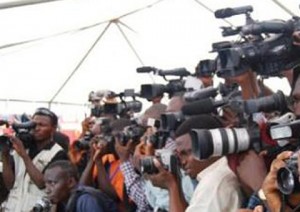Press freedom: Ghana downgraded from free to partly free
 Ghana’s press freedom status has been downgraded from “free” to “partly free” by the Washington-based non-partisan think tank Freedom House, amidst a global deterioration in 2015.
Ghana’s press freedom status has been downgraded from “free” to “partly free” by the Washington-based non-partisan think tank Freedom House, amidst a global deterioration in 2015.
This comes just a week after another advocacy organization, Reporters Without Borders, showed that Ghana’s ranking in press freedom had worsened in its World Press Freedom Index.
The global average score for press freedom as measured annually by Freedom House’s Freedom of the Press Report, declined to its lowest in twelve years. The organization said only 13 per cent of the world’s population now enjoys a free press where media coverage and safety is robust and state intrusion is minimal.
Ghana’s rating by the think tank’s Freedom of the Press Report, deteriorated from 28 to 31 in the index, which uses a scale of 0 to 100 for the best and worst cases of press freedom respectively.
A full country report on Ghana by Freedom House, is not available yet but the think tank explained that Ghana’s new designation was due to an increase in hostility against journalists and the energy crisis which affected the work of the media.
“Ghana’s status declined from Free to Partly Free due to stepped-up attempts to limit coverage of news events and confiscation of equipment; increases in violence directed at journalists by the police, the military, political party members, and ordinary citizens, including the first murder of a journalist in more than 20 years; and continued electricity outages that impaired media production and distribution,” the organization said.
Ghana’s economic and political environment saw marginal declines by Freedom House’s assessment while Ghana’s legal environment was not affected.
Freedom House had complained in its 2015 report that economic sustainability was a challenge for both public and private media in Ghana, and there was some politically-motivated editorial pressure as well as self-censorship by journalists, and media boycotts by government bodies and political parties.
It also noted there was a culture of impunity for physical attacks and interferences against journalists in Ghana during the preceding year.
According to Freedom House, the six most dangerous topics for journalists in 2015 were organized crime, corruption, environment and land development, religion, disputed sovereignty, and lèse-majesté (insulting the state/its officials).
By Emmanuel Odonkor
Copyright © 2016 by Creative Imaginations Publicity
All rights reserved. This article or any portion thereof may not be reproduced or used in any manner whatsoever without the express written permission of the publisher except for the use of brief quotations in reviews.
